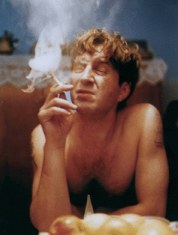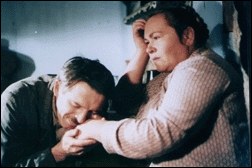Barracks
a.k.a. Barak
|
| |
 |
Russia/Germany,
1999. Unrated. 110 minutes.
Cast: Irina Senotova, Yeveeny Sidikhni,
Yulia Svezhakova, Nina Usatova, Leonid Yarmolnik, Natalya Ygarova
Writers: Valeri Ogorodnikov, Valeri Petrov
Cinematographer: Yuri Klimenko
Producers: S. Archipov, L. Yermolnic
Director: Valeri Ogorodnikov
|
| Grade: C |
Review
by Jeff Vorndam |
 arracks
is one of those zest-for-life-conquers-pain-and-suffering
films where a group of eccentric commoners band together despite their differences.
I'm not sure if other such films exist, but it feels like they do. Set in a
small community in the Ural mountains of Russia in 1953, just after Stalin's
death, Barracks begins with the arrival of Olga
(Irina Senotova). Olga is alone, her entire family wiped out by a Stalinist
purge in Leningrad. She is soon romanced by a militiaman named Alexei, who serves
as the community liaison to the government. Everyone lives in a long hut, barracks
actually, isolated from any towns. Most of the residents have been deported
here. There's Jora, a one-legged Jewish photographer who entertains children
by lighting his farts (eccentric! zany!), plump Polina, the constantly drunk
wife of the mute Tatar Karim, Friedrich, a former German soldier
arracks
is one of those zest-for-life-conquers-pain-and-suffering
films where a group of eccentric commoners band together despite their differences.
I'm not sure if other such films exist, but it feels like they do. Set in a
small community in the Ural mountains of Russia in 1953, just after Stalin's
death, Barracks begins with the arrival of Olga
(Irina Senotova). Olga is alone, her entire family wiped out by a Stalinist
purge in Leningrad. She is soon romanced by a militiaman named Alexei, who serves
as the community liaison to the government. Everyone lives in a long hut, barracks
actually, isolated from any towns. Most of the residents have been deported
here. There's Jora, a one-legged Jewish photographer who entertains children
by lighting his farts (eccentric! zany!), plump Polina, the constantly drunk
wife of the mute Tatar Karim, Friedrich, a former German soldier 
The bulk of the film is simply these folk interacting with each other. Guerka
baits Friedrich constantly for being German. Jora sells homebrewed vodka to
Russian gangsters. Alexei investigates a fugitive murderer at the behest of
some bureaucratic bigwigs. Olga gets settled and organizes a birthday party
for Polina. These people are destitute, and what little they have they must
share. However, they possess a strain of pluck
that makes them resistant to despair. In one scene, Alexei accidentally drops
his gun down the toilet. Everyone gleefully turns over the outhouse and roots
through the shit to find it for him so he doesn't lose face.
A climactic day in which there is a murder, a birth, and a wedding tests their
mettle and provides an apotheosis of communal living. While Russia is
reeling from the horrors of Stalinism, life is putting itself back together
in these barracks.
I found the story and performances mildly amusing but often annoying. There's
only so much nuttiness and tribulation that I can take, and Barracks
taxed my capacity for both within its first half hour. These are people who
find a new identity as cast-offs. No longer Russians, Germans, or Jews, they
are barrack-dwellers, and they stick together. Once that's established, I sat
and waited for the clock to tick out the rest of the running time. The film
is watchable because of its interesting cinematography. Most scenes are shot
on color stock but drained of all color, presumably to emphasize the drab surroundings.
During high-spirited moments color will flood the picture and a scene will end
with a beautiful freeze frame. Many shots, divorced from the humdrum story,
would make great paintings. As a moving picture though, Barracks reaps
small rewards.
Review
© April 2000 by AboutFilm.Com and the author.
Images © 1999 Darfilm.
All Rights Reserved.


